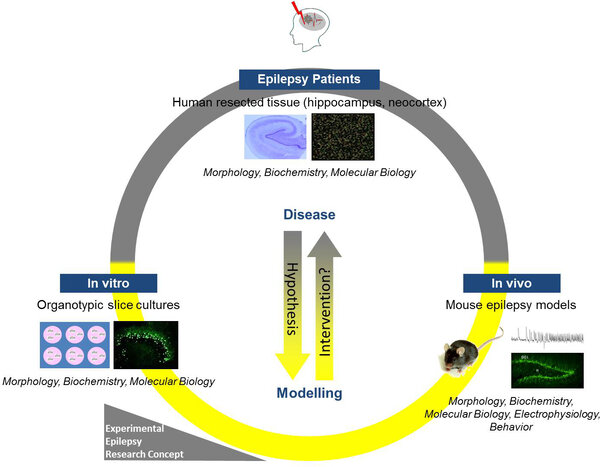Experimental Epilepsy Research
Department of Neurosurgery
Group outing 2023
Latest news
This webpage is not updated anymore. Please see our new lab webpage ‘Translational Epilepsy Research’
Latest publications:
Long-term hippocampal low-frequency stimulation alleviates focal seizures, memory deficits and synaptic pathology in epileptic mice
Kleis P, Paschen E, Djie-Maletz Andrea, Vlachos A, Haas CA, Häussler U
Neurobiology of Disease (2025) https://doi.org/10.1016/j.nbd.2025.106965
Dysregulation of Myelination in Focal Cortical Dysplasia Type II of the Human Frontal Lobe
Donkels C, Häussler U, Huber S, Tiesmeyer N, Demerath T, Scheiwe C, Shah MJ, Heers M, Urbach H, Schulze-Bonhage A, Prinz M, Vlachos A, Beck J, Nakagawa JM, Haas CA.
Glia (2024) https://doi.org/10.1002/glia.24662
Probing hippocampal stimulation in experimental temporal lobe epilepsy with functional MRI
Schwaderlapp N, Paschen E, LeVan P, von Elverfeldt D, Haas CA
Frontiers in Neuroimaging (2024) https://doi.org/10.3389/fnimg.2024.1423770
Low frequency stimulation for seizure suppression: identification of optimal targets in the entorhinal-hippocampal circuit
Kleis P, Paschen E, Häussler U, Haas CA
Brain Stimulation (2024) https://doi.org/10.1016/j.brs.2024.03.017
On-demand low-frequency stimulation for seizure control: efficacy and behavioural implications
Paschen E, Kleis P, Vieira DM, Heining K, Boehler C, Egert U, Häussler U, Haas CA
Brain (2024) https://doi.org/10.1093/brain/awad299
Main research goals
Epilepsy is a brain disease defined as repeated seizures reflecting recurrent, abnormal, and hypersynchronous neuronal discharges. Epilepsy affects 0.5-1% world population, i.e. 50 million people worldwide. In many cases seizures can be controlled by medication though epilepsy cannot be cured yet. However 30% patients with epilepsy suffer seizures that are resistant to pharmacological treatment. In particular focal epilepsies such as mesial temporal lobe epilepsy (MTLE) are often drug resistant. In these cases neurosurgery currently remains the more reliable treatment to control seizures.
The Experimental Epilepsy Research laboratory aims at a better understanding of focal epilepsies with the perspective of developing new tools for treatment and/or intervention. To this end we follow a three-pillar approach involving:
- Analysis of human epileptic brain tissue resected for therapeutic purpose,
- In vivo disease modeling with mouse MTLE models,
- In vitro studies (organotypic hippocampal slice cultures) offering easy accessibility and pharmacological manipulation.
We use a plethora of molecular, biochemical, electrophysiological and behavioral techniques to investigate the role of correct lamination, synaptic reorganization, neuronal loss and generation of new neurons in the epileptic brain.


